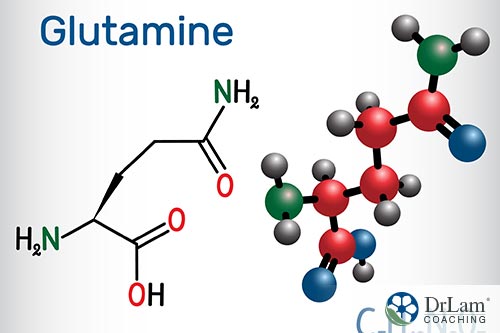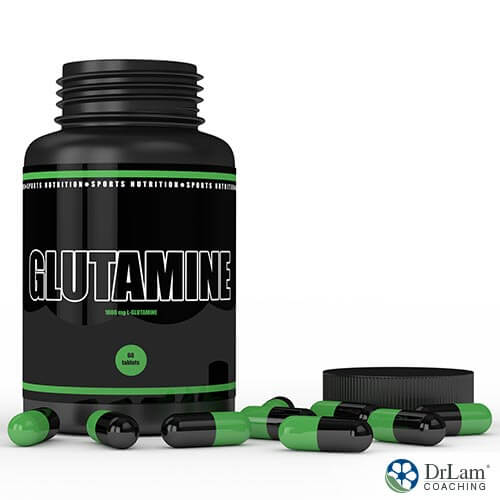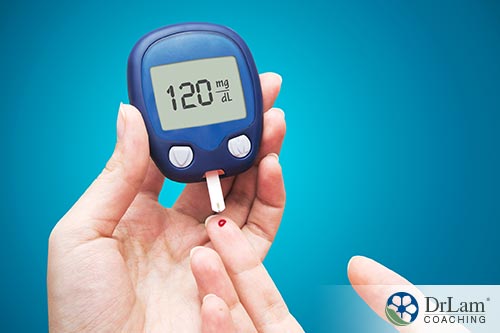 Getting the right combination of nutrients in your diet can be difficult. There are a lot of different nutrients and they all come in different foods in different amounts. This is even more complicated if you’re unwell or have disorders like Adrenal Fatigue Syndrome (AFS). With these types of disorders, you will need to be even more careful to avoid deficiencies and to get the right combination of nutrients to avoid stress. Glutamine is one of the nutrients that not many people know about. And yet, whether you have AFS or not, it’s an essential element for your overall health.
Getting the right combination of nutrients in your diet can be difficult. There are a lot of different nutrients and they all come in different foods in different amounts. This is even more complicated if you’re unwell or have disorders like Adrenal Fatigue Syndrome (AFS). With these types of disorders, you will need to be even more careful to avoid deficiencies and to get the right combination of nutrients to avoid stress. Glutamine is one of the nutrients that not many people know about. And yet, whether you have AFS or not, it’s an essential element for your overall health.
Glutamine is produced in your muscles and moved around the body in the bloodstream. As the most abundant free amino acid in the body, it’s a vital building block in your body’s production of essential proteins. Glutamine can be found in certain foods and it can also be taken in tablet or powder form if you find you need more than you're getting through your regular eating habits. GlutaMax is a good supplemental source of Glutamine. Some of the benefits of glutamine are:
A normal diet should contain between three and six grams of glutamine a day, though this can vary widely depending on what you're eating. However, studies have examined the effects of supplementing with up to 45 grams a day with only minimal side effects. If you decide to supplement, make sure you start at a low dose of five grams and increase from there.
Because of the varied uses and functions of glutamine, it’s given to people who need improved nutrition for:
There is also some evidence that this nutrient may help with the following issues, though there isn’t enough evidence at this stage:
 Glutamine can be very helpful if you have AFS. AFS is a stress-related disorder caused by the overuse and the breakdown of the NeuroEndoMetabolic (NEM) stress response. There are six circuits involved in the NEM stress response and these go through changes as a result of stress to help your body cope with the demands and dangers of stressful situations.
Glutamine can be very helpful if you have AFS. AFS is a stress-related disorder caused by the overuse and the breakdown of the NeuroEndoMetabolic (NEM) stress response. There are six circuits involved in the NEM stress response and these go through changes as a result of stress to help your body cope with the demands and dangers of stressful situations.
The problem comes when you’re stressed all the time. This is a very unhealthy and unnatural situation. The NEM stress response becomes overused and thus fatiguing the adrenal glands. The adrenals excrete cortisol, the primary stress hormone, and the driver of many of the stress-related changes in the body. As the adrenals fatigue, they start to struggle to keep up with the ongoing high demand for cortisol and can start to break down.
The body’s circuits are also individually and collectively affected by their constant state of overactivation and the body-wide cortisol overexposure. When cortisol levels remain high instead of dropping after the stressful situation is over, the circuits remain in an unnatural state of overexcitation and start to become unbalanced. This can cause malfunctions in the overall circuit as well as in the individual components of the circuit.
The Inflammation Circuit is strongly involved when you have AFS because of the role that inflammation plays in stress. Inflammation is a natural response to injury or illness. It’s designed to rid the body of the invader that’s causing the problem and then subsides. But stress isn’t something that can be forced out of the body. So, when you’re stressed, inflammation increases but has no clear function. If your stress levels don’t decrease again, the inflammation can become chronic. This is a problem because chronic inflammation has been implicated in a range of problems and disorders including stroke, cancer, and heart disease.
Glutamine can help rebalance the Inflammation Circuit by improving the health of the gut and the immune system. These two components, along with the microbiome or the bacteria that live in your body, make up the Inflammation Circuit. When you’re under stress, the immune system becomes overactive and causes rampant inflammation. This causes even more stress and more inflammation as well as imbalances in the immune system itself. The inflammation in turn affects the health and functioning of the gut and the bacterial balance in your body. The result can be gut problems like constipation and diarrhea, infections, or leaky gut as bad bacteria become more prevent, and food sensitivities or allergies because of the changes in the immune system.
This can be a very unhealthy and frightening situation. However, glutamine can help by:
 This nutrient can encourage the growth of new cells and help improve the intestinal lining. This will help to improve gut health and encourage the healing and repair of any damage, leading to better digestion and nutrient absorption as well as decreased gut permeability. This improved gut health may also help decrease gut symptoms such as bloating, and constipation.
This nutrient can encourage the growth of new cells and help improve the intestinal lining. This will help to improve gut health and encourage the healing and repair of any damage, leading to better digestion and nutrient absorption as well as decreased gut permeability. This improved gut health may also help decrease gut symptoms such as bloating, and constipation.
Glutamine is essential for immune function. When you’re stressed or ill, your immune system increases its consumption of this nutrient to aid with the production and dispersal of cytokines and lymphocytes, two powerful types of immune system cells. So, if you have rampant infections or illnesses related to AFS and immune system malfunctions, increasing your intake of this nutrient may help.
Your body’s pH levels are pivotal in determining which bacteria thrive and which are depressed. By helping to return your body to a more natural pH balance, glutamine may help to improve the health and natural balance of your microbiome. This will improve the health and functioning of the Inflammation Circuit overall.
Glutamine is one of the most helpful amino acids for leaky gut repair. This is a common complaint of people with AFS. There are normally small openings in the intestinal walls which allow water and nutrients to flow out into the body. However, as gut health declines in AFS, these junctions become looser and the mucosal integrity of the lining declines. These problems allow the movement of more particles from the gut and into the bloodstream. These toxins and bacteria can increase the activation of the immune system and cause bloating, fatigue, food sensitivities, and digestive issues. All of these problems will worsen your Inflammation Circuit imbalance and cause more stress, making your AFS symptoms and problems worse as well.
Glutamine is vital in the maintenance of the mucosal integrity of the gut. It's used to fuel metabolism and also to help repair any damage done to the gut lining. So, if you have AFS and Inflammation Circuit dysfunction, glutamine could help repair some of the damage done to your gut and alleviate leaky gut symptoms.
 If you’re getting all your glutamine through the food you eat, then you’re unlikely to experience side effects. It would be very difficult to get enough of this nutrient to experience adverse effects purely through normal eating. However, if you decide to take supplements, then don’t take a high dose. A generally considered safe range is 500 mg - 5000 mg. This is a safe dose for most adults, but you may experience mild side effects like:
If you’re getting all your glutamine through the food you eat, then you’re unlikely to experience side effects. It would be very difficult to get enough of this nutrient to experience adverse effects purely through normal eating. However, if you decide to take supplements, then don’t take a high dose. A generally considered safe range is 500 mg - 5000 mg. This is a safe dose for most adults, but you may experience mild side effects like:
People who should avoid supplementing with this nutrient include:
If you have AFS, then you will need to be a little more careful if you take this nutrient. You must introduce this change slowly, to avoid overwhelming your already stressed and overtaxed body. Adrenal crashes may be triggered in those who are weak. When you have AFS, even healthy changes can bring additional stress and cause side effects or paradoxical effects. So, it’s important that you only make this change carefully and with the help of a trained professional. They will be able to guide you in introducing more of this nutrient to your body in a safe way. For the best results, DHEA and pantethine may often be used in conjunction. This is especially nourishing for those with irritable bowel symptoms. Again, those with advanced adrenal fatigue need to be careful and not self navigate.
People with AFS may also experience additional issues when they start supplementing with this nutrient. Glutamine can be converted to the excitatory neurotransmitter (NT) glutamate. This is an NT used by the cells to send nerve signals. Too much of this NT can cause overexcitation of the neurons. If you’re already stressed and your systems are already overexcited, then this is the last thing you want and will add to your stress levels. This emphasizes how important it is that you work with a medical professional to add more of this nutrient to your diet.
 It’s always best that you try to get the nutrients you need from your food and this applies to glutamine for most people. Nutrients in food exist in a delicate balance that allows for optimum absorption and reduces the risk of side effects. If you’re trying to get more of this nutrient every day, then here’s what you should be eating more of:
It’s always best that you try to get the nutrients you need from your food and this applies to glutamine for most people. Nutrients in food exist in a delicate balance that allows for optimum absorption and reduces the risk of side effects. If you’re trying to get more of this nutrient every day, then here’s what you should be eating more of:
Eating organic, lean meat like chicken, beef, or pork, will provide your body with more glutamine. This includes organ meat, which has been shown to promote faster, better healing.
Eat more shrimp, crabs, mussels, or saltwater fish to get more of this nutrient.
Organic dairy products like milk or yogurt will give you more of this nutrient. Yogurt will also help rebalance your gut bacteria and improve digestion while grass-fed milk contains glutamine and will help with the production of the antioxidant glutathione. Ricotta cheese is also a good option.
Eggs contain a healthy mix of nutrients, including glutamine, and can be eaten in a variety of ways which makes them a flexible and tasty snack.
Nuts contain healthy fats and protein and are abundant in glutamine.
If you can’t eat meat or need to restrict your intake, then beans are a good substitute. You could also include more legumes like chickpeas, peas, or lentils in your diet for the same benefits.
Dark, leafy greens like kale, parsley, lettuce, cilantro, collard greens, and radish greens are also good choices. They also contain lots of other nutrients that will benefit your health like dietary fiber, vitamins, and minerals.
Bone broth will provide you with this nutrient and boost your immune system at the same time.
Red cabbage is versatile and rich in glutamine. It also boosts your immune system and your overall health.
Both white and green asparagus can provide this nutrient and help prevent muscle loss and decrease healing time.
If you’re trying to get more glutamine in your diet, then you need to be careful about how you get it and the effects that it’s having in your body. Some of the first steps you should take if you need to increase your intake of this nutrient are:
If you need help with your nutritional intake, the team at Dr. Lam Coaching can help. We offer a free** no-obligation phone consultation at +1-626-571-1234 where we will privately discuss your symptoms and various appropriate choices. You can also send us a question through our Ask The Doctor system by clicking here.
© Copyright 2021 Michael Lam, M.D. All Rights Reserved.
Glutamine is one of the essential amino acids as it benefits several circuits in your body and other health functions. But, it’s easy to become deficient in this nutrient, which will have dire health consequences. But, if you have adrenal fatigue then get a healthcare professional's guidance before taking glutamine.
